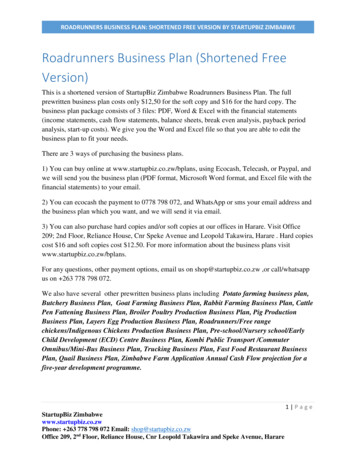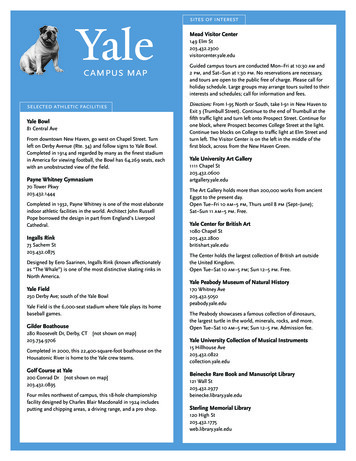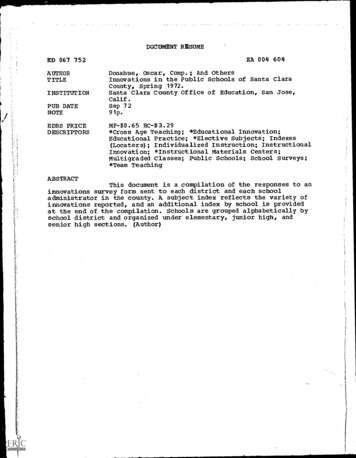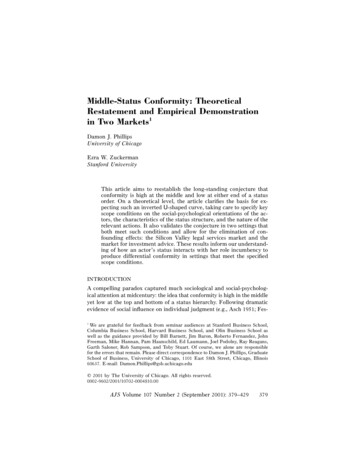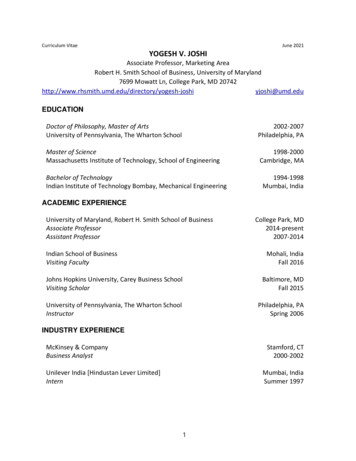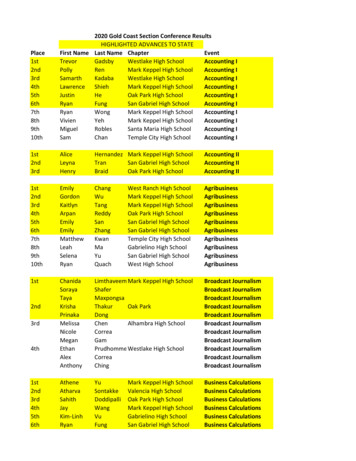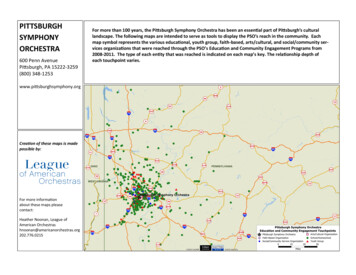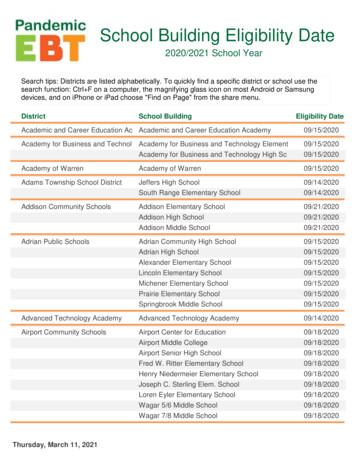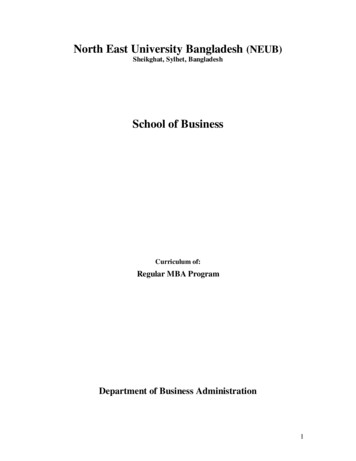
Transcription
North East University Bangladesh (NEUB)Sheikghat, Sylhet, BangladeshSchool of BusinessCurriculum of:Regular MBA ProgramDepartment of Business Administration1
Master of Business Administration (MBA)The MBA program under the School of Business of Northeast University of Bangladesh(NEUB) aims to increase the technical and managerial competency of the students for thedecision making levels for the industry, business, government and non governmentorganizations so that they can contribute efficiently in the economic development of thecountry and over the world. This program will help the students in acquiring the decisionmaking skills, communication skills, writing skills and will make capable to buildinterpersonal relationship for the success of the organization. The program is designedwith the combination of multidisciplinary itinerary and practical knowledge.Program Description: The MBA Program is of 64 credits consisting 20 taught coursesand one practical course of two years duration. The taught courses again are divided into08 foundation level courses, 08 core courses and 04 concentration (major) courses.Students are required to take courses in a predetermined sequence offered throughout theyear. The calendar year is divided into three academic semesters of 4 months each. Theacademic semester’s are- i. Spring Semester (January- April) ii. Summer Semester (MayAugust) and iii. Fall Semester (September- December). Students can take admission inthrice in a year at any semester. Before going to internship/ project work students shouldselect any one area of concentration from the following six areas:1. Accounting and Information Systems2. Finance;3. Management;4. Marketing;5. Banking and Insurance; and6. Human Resource Management.Note: Candidates with undergraduate degree in business may be waived a maximum of24 credits from the foundation level courses only satisfying the course waiver policy ofthe university.2
Program structureType of CourseNo. ofCoursesFoundation LevelCoursesCore coursesElective (Concentration )coursesInternship/Project workTotalCredit ksMay bewaivedCompulsory--Course Abbreviation and Elaboration:Serial01020304050607080910111213Course JCourse sEconomicsBusinessAccounting and Information SystemsFinanceBankingMarketingHuman Resource ManagementInternshipProject workFoundation Level Courses:Serial0102030405060708Course 525FIN-527Course TitlePrinciples of ManagementFinancial AccountingBusiness MathematicsBusiness CommunicationManagerial EconomicBusiness StatisticsPrinciples of MarketingPrinciples of FinanceCredits03030303030303033
Core Courses:Serial Course Code01MKT-53102ACC- BUS-547Course TitleMarketing ManagementManagerial Accounting for DecisionMakingStrategic ManagementManagerial FinanceOrganizational BehaviorHuman Resource ManagementCorporate Governance and Corporate SocialResponsibilityAdvance Business Research methodsCredits0303030303030303Elective Courses in the Concentration Areas:(Any 04 from anyone of the following areas): 04 Courses X 03 Credits 12Credits1. Accounting and Information Systems:SerialCourse Code01ACC-55102Course TitleCredits03ACC-553Accounting Theory and StandardsCorporate Financial Reporting andAnalysis03ACC-555International ACC-561Budget and Budgetary ControlAdvanced AuditingHuman Resource AccountingAccounting Information SystemFinancial Analysis and Control03030303032. Finance:SerialCourse 6FIN-5590708Course Title03Credits0303030303FIN-560Corporate FinanceInvestment TheoryFinancial DerivativesInternational Financial ManagementManagement of Financial Institutionsand Capital MarketInvestment Analysis and PortfolioManagementInsurance and Risk ManagementFIN-561Project Management0303034
3. Management:Serial Course Code01MGT-55102MGT -55303MGT-55504MGT -55705MGT -55806MGT -55907MGT- 56008MGT-5614. Marketing:Serial Course 6MKT-559Course TitleOrganizational Development and DesignManagement of Change and TechnologyComparative ManagementLeadership theory and PracticesManagement of NGO and StateEnterprise in BangladeshIndustrial Relations and ConflictManagementTotal Quality ManagementInformation and Knowledge ManagementCourse TitleConsumer BehaviourStrategic MarketingBrand ManagementE-MarketingTourism and Hospitality MarketingRelationship 35. Banking and Insurance:Serial Course Code01BNK-5510203040506BNK -553INS -555INS -557BNK -558INS-559Course TitleManagement of Central Bank andCommercial BankMerchant and Investment BankingInsurance and Risk ManagementClaims and Premium ManagementE-banking and Mobile BankingUnderwriting and Portfolio of RiskCredits0303030303036. Human Resource Management:Serial Course 6HRM-559Course TitlePerformance Appraisal and CompensationManagementHuman Resource Planning and StaffingLegal Aspects of Human ResourceManagementOrganization and Conflict ManagementManagerial Skills Development andManagementComparative Perspective of HumanResource ManagementCredits0303030303035
Semester-wise Course DistributionFirst Semester:CourseCourse TitleCodeMGT- 511 Principles of ManagementACC- 513 Financial AccountingMAT- 515 Business MathematicsBUS- 517 Business CommunicationsType ofthe itSecond Semester:CourseCourse TitleCodeECO- 521 Managerial EconomicsSTA- 523 Business StatisticsMKT- 525 Principles of MarketingFIN- 527 Principles of FinanceType ofthe itThird Semester:CourseCourse TitleCodeMKT- 531 Marketing ManagementACC- 533 Managerial Accounting for Decision MakingBUS-535 Strategic ManagementFIN-537 Managerial FinanceType ofthe CourseCoreCoreCoreCoreCreditType ofthe CourseCoreCoreCoreCreditCore03Fourth Semester:CourseCourse TitleCodeBUS-541Organizational BehaviorHRM-543 Human Resource ManagementBUS-545Corporate Governance and CorporateSocial ResponsibilityBUS-547Advanced Business Research Methods030303030303030303030303030303Fifth Semester (Concentration Courses): Students should take any four courses fromthe schedule of his/her concentration area as mentioned earlier according to the rules ofNEUB.Sixth Semester:Course codeINT/PRJ- 599Course TitleInternship/ Project workCredits04 credits6
Course DescriptionFoundation Level Courses:MGT-511: Principles of Management: 3 CreditsProvides a basic discussion of the environments, approaches, principles and process ofmanagement. Topics include environmental forces, planning, organizing and controlprocesses, motivation, teamwork, group dynamics and leadership in business and nonbusiness organizations.ACC-513: Financial Accounting: 3 CreditsThe course deals with functional of bookkeeping and accounting. It covers the basicaccounting concepts, double-entry system of book-keeping, recording of transaction,accounting principles, preparation of trial balance, treatment of adjustment entries,preparation and analysis of financial statements, accounting for assets and liabilities,inventory valuation and depreciation, internal control and check, accounting system andaccounting practices in different types of organization.MAT-515: Business Mathematics: 3 CreditsTrigonometry: Trigonometric ratios, Coordinates Geometry: Coordinates and its midpoints, Straight lines. Theory of sets: Elementary set, operations with sets, venndiagrams, Applications of set Theory, Differential Calculus: Graphs of MathematicalFunction, limit of the function. Continuity of the function, Derivative, Differentiation ofalgebraic function, Exponential function, Differentiation of logarithmic function,Application of derivative, partial differentiation, Maxima and minima, Businessapplication of differential calculus, Integral Calculus: Indefinite integral, Some rules ofintegration, Some standard formula for integration, Definite integral, Rules of definiteintegral. Differential equation: Introduction to differential equation, Ordinary differentialequation of 1st order & 1st degree, Matrix: Deferent types of Matrices, Matrix operation,Equivalence matrix, Rank of the matrix, system of equations, Mathematics of finance.BUS-517: Business Communication: 3 CreditsUnderstanding the principles and methods of communication; composing, editing andrevising business documents; Use of letters, Memos and E-mail; Business Report writing,Non-verbal Communication; Listening and using the Telephone; Conducting andParticipating in Meetings.ECO-521: Managerial Economics: 3 CreditsThis course focuses on the problem of business decisions, making extensive use of cases.Topics include basic supply-demand theory and marginal analysis, the structure ofdecision problems, the impact of the market setting (i.e. competitive, oligopolistic ormonopolistic structures) and strategic interactions among firms using game theory. The7
emphasis throughout is on the use of economic reasoning to solve actual businessdecision problems. The course also includes Computation of National Income andProduct; Aggregate supply and demand models; Savings, consumption and investment;Aggregate levels of production; Theory of money and inflation; Monetary and fiscalpolicy.STA-523: Business Statistics: 3 CreditsNature of business data and the methods of collecting business data; Designingquestionnaire, sampling methods, interviews; Presenting the collected data throughcharts, diagrams and graphs; Statistical averages and dispersion; Simple correlation andregression; Business Forecasting; Time series analysis; Index Numbers; Elementaryprobability and test of hypotheses.MKT-525: Principles of MarketingUnderstanding of marketing and the marketing process including marketing environmentDevelopment of marketing opportunities and strategies which includes the marketinginformation system and research, consumer markets and consumer buyer behavior,business markets and business buyer behavior, segmentation, targeting and positioningfor competitive advantage and marketing mix & its elements. Use of marketing cases.MKT-527: Principles of FinanceNature and goals of business finance, short-term and long-term sources of finance,financing decision and leverage, cost of capital, capital structure theories and designingcapital structure, working capital-determination and management.Core Courses:MKT-531: Marketing Management: 3 CreditsMarketing philosophy and concept; Marketing environment; Consumer behavior process;Elements of marketing mix; Market segmentation and positioning; Pricingconsiderations; Promotion; Channel of distributions; Marketing ethics; Extendedmarketing and Relationship marketing.ACC-533: Managerial Accounting for Decision Making: 3 CreditsUnderstanding managerial accounting and the business environment, Cost terms,concepts, and cost behavior, Cost-volume-profit analysis, Relevant costs for decisionmaking, Budget and budgetary control, Capital budgeting, Cash flow statement.BUS-535: Strategic Management: 3 CreditsAnalysis of policy formulation and implementation from a company wide standpoint;emphasis on integration of knowledge and approaches across functional areas; techniquesof strategy formulation and implementation by single-business, diversified andmultinational firms.8
FIN-537: Managerial Finance: 3 CreditsThis course presents the basic principles and analytical techniques of financialmanagement. The main objective here is to familiarize students with basic financialconcepts, methods and techniques managers use to successfully run the financial affairsof a company. Major topics to be covered in this course include time value of money,security valuation, risk and return, bond and equity valuation and market, fundmanagement, capital budgeting, cost of capital, net working capital and short termfinancing decisions.BUS -541: Organizational Behavior: 3 CreditsThe objective of this course is to familiarize students with both traditional and emergingconcepts and trends of management and organizational behavior. Students are preparedfor general management and supervisory positions and are provided background forfurther study in specialized topics in management and organizational behavior. Coversissues of individual behavior, group functioning and the actions of organizations in theirenvironments. Problems of work motivation, task design, leadership, communication,organizational design and innovation are analyzed using multiple theoretical perspectives.Implications for the management of organizatio0ns are illustrated through examples,cases and exercise.HRM-543: Human Resource Management: 3 CreditsScope, role and function of Human Resource Management; Staffing the 0rganization:human resource planning and forecasting, recruitment selection; Job design and analysis;Job evaluation; Performance management; Training and development; Disciplinarymeasures; Human resource audit and research; Forms of employee participation; LaborRelations; and Work Environment and Human resource management systems.BUS- 545: Corporate Governance and Corporate Social Responsibility: 3 CreditsThis course will include –Concepts of corporate governance (CG) Corporate SocialResponsibility ( CSR), Overview of CG and CSR, Theory and Practice of CG and CSR,Agents and Institutions of CG, Facilitators, Role Players and Regulators of CG, Issuesand Problems of CG in Bangladesh. CG and CSR in a Global SocietyBUS- 547: Advanced Business Research Methods: 3 CreditsThis course includes- Sampling Design, Measurement and Scaling techniques,Processing and Analysis of Data, Development hypothesis, Testing of hypothesis- Chisquare test, ANOVA, Z-test, T-test, Interpretation and Report writing.9
Concentration Courses:ACC-551: Accounting Theory and Standard: 3 CreditsAn interpretative study of the origin and evolution of the accounting thoughts; thedevelopment of accounting theories; conceptual framework of accounting; DevelopmentAccounting Standard, International Accounting Standard(IAS), Bangladesh AccountingStandard(BAS), Elements of financial statements along with their reporting anddisclosure IAS .ACC-553: Corporate Financial Reporting and Analysis: 3 CreditsIncludes meaning of the Corporate Financial Reporting (CFR ), Objectives of CFR, Usersof CFR, Standards of CFR, Corporate Financial Reporting and Analysis Environment,Corporate Financial Reporting Fundamentals, Statutory and Non-Statutory Dimensionsof Corporate Financial Reporting, New Perspective in Corporate Financial Reporting,Adequate Disclosure in Corporate Financial Reporting, Corporate Accountability andThe Independent Auditor, Framework for Financial Statement Analysis, FinancialStatement Analysis: Various tools and techniques of financial analysis and application ofthese tools and techniques in analyzing financial statements necessary for practicalbusiness decisions.ACC-555: International Accounting: 3 CreditsUnderstanding growth and spread of multinational operations, global competition, crossborder mergers and acquisitions, internationalization of capital markets, European equitymarkets. Development and classification, comparative3 accounting, Reporting anddisclosure, Foreign currency translation, Financial reporting and changing prices,International accounting harmonization, International financial statement analysis,International taxation and transfer pricing.ACC-557: Budget and Budgetary Control: 3 CreditsUnderstanding budget, budgeting and budgetary control systems, difference betweenplanning and control, budget period, budget committee. Kinds of budget. Budget on thebasis of period: Short-term budget and long-term budget. Budget on the basis offlexibility: Fixed budget, Flexible budget. Budget on the basis of function: Productionbudget, Purchase budget, Sales budget, Plant utilization budget, Production cost budget,Administration cost budget, Capital expenditure budget, Research and developmentbudget, Cash budget, Responsibility budget, Master budget, etc.ACC-559: Advanced Auditing: 3 CreditsThis course will provide about -Accounting profession in Bangladesh- rules ®ulations governing the profession- institutes of chartered accountants of Bangladesh &England & Wales, AICPA- professional ethics- Auditors independence. International10
auditing guidelines. Auditor’s report & certificates- qualified and unqualified report.Profit; Divisible profit and dividends- capital profit - leading cases. Statutes affecting theaudit & auditors of Banks, Insurance, Companies, Co-Operative societies; Educationalinstitute and local authorities. Government audit – legal framework and practices- preaudit- post audit functions of the director general of audit. Audit of computerizedaccounting system.ACC-559: Human Resource Accounting: 3 CreditsIntroduction to Human Resources Accounting: HRA scenario; Development of HRA;Human as capital in organizations; Human resources accounting approaches.Cost approach to human resources: Acquisition cost Model; Replacement cost model;Value Approach to human resources: value to the organization; present value of futureearnings method; discounted future wage model; Competitive Bidding of method;Expense model. Managerial accounting decisions regarding human capital; Recruitmentplanning; Turnover Analysis; Personnel advancement analysis; capital budgeting;Information management in human resources accounting; Monetary measures forassessing individual values; Intellectual capital; characteristics of human capital;Investment Decisions in human capital; Classification of human capital; capitalization ofhuman cost; Future development of human resources accounting.ACC-560: Accounting Information System: 3 CreditsThe integration of information flows of various segments of a business organization intoan information system of the total organization with emphasis on the accounting aspectsof electronic data processing (EDP). Examines the fundamentals of accounting systemsdesign including systems analysis and design techniques, surveys, hardware and softwareconsiderations, control of computerized systems in corporate business environment.ACC-561: Financial Analysis and Control: 3 CreditsFinancial statement analysis: Meaning ,purpose and types, users ,scope importance,limitations. Common sized statement: comparative financial statements, trendpercentages. Ratio analysis :Liquidity, leverage activity and probability ratio, theoreticalfoundation of ratio analysis, the cross-sectional and time series analysis, computation andinterpretation of ratios, limitations of ratio, analysis, inflation and ratio analysis. Fundflow analysis: meaning of fund ,purpose, importance preparation interpretation ofstatement of working capital changes and the funds flow statement. Analysis ofLeverage: Concepts, computing and interpreting operating ,financial and combinedleverages, leverage and risk. Financial Forecasting; concepts, Purpose and importanceof financial forecasting, forecasting methods, trends, graphical and statistical methods,Pro-forma financial statements, Problems in financial forecasting. Financial distress11
prediction: Importance of predicting financial distress, problems in defining financialdistress, the univariate and multivariate models of distress prediction. Budgetarycontrol: Budget and budgetary control, objectives and steps of budgetary control,functional budgets, the master budget, preparation and interpretation of the cash budgetand master budget.FIN-551: Corporate Finance: 3 CreditsThis course will examine the investment and financing and their interrelationship. It aimsto obtain a comprehensive and in-depth perspective of the area of corporate finance. Itincludes-financial analysis and planning, valuation, capital budgeting, capital structure,dividend policy, mergers and acquisition, bankruptcy, lease financing, multinationalfinancial management and risk management.FIN-553: Investment Theory: 3 CreditsIt will give emphasis on investment in financial assets and securities. It will cover thevaluation of bond, equity valuation, portfolio diversification, efficient market, CAPM,and valuation of others securities.FIN-555: Financial Derivatives: 3 CreditsThis course emphasis on the options and others financial derivatives. It includes- putoption, call option, future and forward markets, swap markets and their inter relations.Hedging, and speculative with derivatives, implementation of derivatives tradingsecurities.FIN-557: International Financial Management : 3 CreditsThe course is intended to introduce students to the overall environment of multinationalcorporations and challenges faced by MNCs in the changing scenario of globalization.Major topics include exchange rate determination and international monetary system,balance of payment and international monetary linkage, the foreign exchange market,parity conditions and currency forecasting, managing exchange rate risk, multinationalworking capital management and short-te3rm financing, foreign investment analysisforeign direct investment, and corporate strategy, investment analysis of multinationalcompanies, international financing and international financial markets, internationalmarkets for stocks and bonds, the Euro dollar and euro bond markets.FIN-558: Management of Financial Institutions and Capital Markets: 3 CreditsIntroduces student about the growth and development of financial institutions, capitalmarket, financial markets and institutions of the world. Major topics include operations,mechanics and structure of financial institutions including banks, insurance companies,investment companies, pension funds etc, analyses of the wide array of financialinstruments that are now available in the global money and capital markets for investing,12
financing and managing risk, and discussions on regulations, monetary policy andinternational financial system.FIN-559: Investment Analysis and Portfolio Management: 3 CreditsThe course deals with the principles of investment in the securities and other assetmarkets. Major topics include securities markets, price performance of securities,industry analysis, basic stock valuation models, investment in special situations offeringabnormal returns, bonds and fixed investment fundamentals, mutual funds, convertiblesand warrants, real estate investment, precious metals, stones and collectibles, andmanagement of investment portfolio.FIN-560: Insurance and Risk Management: 3 CreditsThis course will examine the non-speculative risks in the business enterprise withemphasis on insurance as a tool, It will include- concepts of risks and insurance, types ofrisks, analysis of risks, control of risks, different types of insurance, risk in all types ofinsurance and minimization of risks. Legal principles in Risk and insurance,FIN-561: Project Management: 3 CreditsThe course deals with project identification, preparation, appraisal, management ofimplementation and post project evaluation. This course acquaints the students with latestavailable project management software. Basic techniques like network analysis,organizing and control aspects of project implementation in relation to resources, timescale and information processing are emphasized. Feasibility study of a business projectis a major part of the course.MGT-551: Organizational Development and Change : 3 CreditsProvides an understanding of the introduction of Organizational Development (OD)field of OD. History of OD, Values, Assumptions and Beliefs of OD, theories andmanagement of OD- foundation of OD, Managing the OD process, OD interventionsteam intervention, Comprehensive OD interventions, structural Interventions and theapplication of OD, Training experience, key considerations and issues in OD- issues inconsultant –client relationship, System ramifications, power politics and OD, Researchon OD, the future of OD.MGT-553: Management of Change and Technology: 3 CreditsThis course will examine how change and technology of scientists and engineers can bestrategically managed and integrated with the organizational needs to achieve competitiveadvantage. Major topics include management of technology in manufacturing and serviceindustries, technology transfer and organizational strategies in achieving and maintainingcompetitive edge in the global market place, importance of integrating technologyplanning, product planning ,business planning and the market demands; human social and13
environmental concerns associated with technology change and market requirement,business strategy and technology strategy local and global strategy.MGT-555 Comparative Management: 3 CreditsThis course will provide an introduction of Management Practice in Bangladesh,Japanese Management, American Management, Management of China, Cross-culturalManagement.MGT-557: Leadership theory and Practices: 3 CreditsThis course deals with the analysis of individual behavior and influence in organization.It will examine power structure and leadership theories in organizational effectiveness.Role of power and leadership in decision making processes, communication, conflictresolution in large organizations.MGT-558: Management of NGOs and State Enterprises in Bangladesh : 3 creditsThis course include growth and development of NGOs in Bangladesh, role of NGOs,Scope of NGOs,Management of NGOs, Management levels of State enterprise,corporations, decision making process in NGOs, enterprises and corporations.MGT-559: Industrial Relations and Conflict Management: 3 creditsThis course studies the scope and nature of industrial management particularly inBangladesh. Focuses on the procedure, subject matter and legal matters of collectivebargaining, role of unionism in industrial, manufacturing and service sectors, labornegotiation process and techniques, conflict management design, effects of conflict inorganization, facts of conflict, resolving and eliminating conflict, diagnostic model ofinterpersonal conflict, techniques for managing conflict.MGT-560: Total Quality Management: 3CreditsExamines major issues of TQM, principles and theories. Evolution of TQM as a separatebody of management theory is addressed. Topics include: Deming’s Juran’s and Crosby’sTQM principles, leadership information and analysis, JIT, strategic quality planning,employee involvement and empowerment, human resources management in TQM,management of process quality, quality and operational results, customer focus andsatisfaction, buyer-supplier-customer relationships in TQM, TQM models, qualityperformance management, study of ISO 9000 series and their applicability inBangladesh.MGT-561: Information and Knowledge Management:Meaning of Information and Knowledge Management(IKM),Objectives of IKM, Scopeof IKM, Differences between individuals and information and knowledge practices,Contemporary issues, trends, innovation and forces for change in information practice;and ethical practice and operation with integrity, rigour, self reliance and cooperation in14
professional contents, Strategic IKM and information policy, IKM governance, enterpriseinformation architecture and web content management, planning and developing IKMsystems to support key business process, managing knowledge and information resourcesand services. Comparative study with productivity and sustainable IKM organizationalstrategy.MKT-551: Consumer Behaviour: 3creditsApplication of behavioral science theories, concepts, methods, and research findings tothe understanding and prediction of consumer behaviour to the decision-making processof marketing managers. An interdisciplinary approach to the study of the decision makingability as it applies to the purchase of consumer goods. Examines social andpsychological influences on individuals, household and organizational buyer behavior.Investigates buyer behavior models and applies them in the marketing decisions.MKT-553: Strategic Marketing: 3 CreditsThe course deals with formulation, implementation and control of marketing strategiesand involves scanning of business environment with a focus on key marketing issues andan appraisal of the management of marketing functions. The course discusses marketingstrategy, defining and analyzing markets, market segmentation, analyzing competition,market targeting and positioning strategies, marketing strategies for selected situations,planning for new products, product portfolio strategy, designing effective marketingorganizations, marketing strategy implementation and control and other relevant topics.MKT-555: Brand Management:3 CreditsConcept of branding; Advantages and implications of branding; Scope of brandmanagement; Responsibility of brand manager; Product portfolio analysis; Brandingpolicy and strategy; New brand development; Price and Non-price competition;Distribution of brands and economics of branding.MKT-557: E-Marketing: 3 CreditsIntroduction of e-marketing and online consumer behavior, Strategic e-marketing and thee-marketing plan, Online segmentation and targeting strategies, differentiation andpositioning strategies, New digital media, online ethical and legal issue, Marketingknowledge, E-Marketing communication tools, Product as an online offer, Online pricingstrategies, Distribution channelsMKT-558: Tourism and Hospitality Marketing: 3CreditsUnderstanding the tourism and hospitality marketing process, The global tourism andhospitality marketing environment, Developing tourism and hospitality marketingprograms and strategies, Developing the tourism and hospitality marketing mix,15
Managing tourism and hospitality marketing activities, Contemporary issues in tourismand hospitality marketing.MKT-559: Relationship Marketing: 3 Cr
4. Marketing: Serial Course Code Course Title Credits 01 MKT-551 Consumer Behaviour 03 02 MKT-553 Strategic Marketing 03 03 MKT-555 Brand Management 03 04 MKT-557 E-Marketing 03 05 MKT-558 Tourism and Hospitality Marketing 03 06 MKT-559 Relationship Marketing 03 5. Banking and Insurance:

